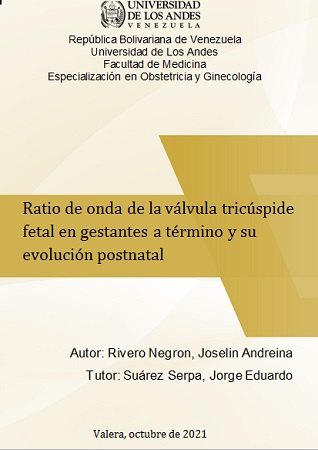Ratio de onda de la válvula tricúspide fetal en gestantes a término y su evolución postnatal
Fecha
2021-10-28Autor
Rivero Negron, Joselin Andreina
Metadatos
Mostrar el registro completo del ítemResumen
Las técnicas de flujometría Doppler han permitido entender de mejor manera la hemodinámia feto placentaria y sus variantes fisiopatológicas. Esto ha traído implícitamente la oportunidad de llevar a cabo acciones encaminadas a disminuir la morbimortalidad fetal y neonatal. Objetivo: Comparar el ratio de onda de la válvula tricúspide fetal en gestantes a término con y sin factores de riesgo y su evolución postnatal que acuden al Servicio de Obstetricia del Hospital “Dr. Pedro Emilio Carrillo” en el periodo de Enero - Julio 2021. Métodos: Estudio cuasi experimental, correlacional con un diseño longitudinal prospectivo, integrado por 60 pacientes, la población está divida en dos grupos uno de estudio y otro de control según los factores de riesgo que presentaron. Resultados: El promedio de edad fue de 27,96 ± 7,28 años, la clase obrera 40%, menos de 8 controles prenatales 75%, la paridad 2,16 ±1,51, edad gestacional 38,40 ± 1,16 semanas, 43,3% presentaron preeclampsia, 30% restricción del crecimiento intrauterino, la media de la onda E fue de 15,24 ± 0,97 y de la onda A 16,41 ± 1,28, la media del ratio fue de 0,92 ± 0,09, 46,61% de los recién nacidos ingresaron a UNEC y 23,3% a UCIN, 23,3% presentaron hipoxia perinatal y 3,33% taquipnea transitoria como diagnóstico de ingreso a UCIN. Conclusiones: Predominaron las pacientes de la clase obrera, con embarazos mal controlados, multíparas, con embarazos a términos, presentaron preeclampsia y restricción del crecimiento intrauterino, el ratio superior a 0,93 es un factor pronóstico para alteraciones hemodinámicas, ingreso a los servicios de UCIN y presentar hipoxia. Doppler flowmetry techniques have made it possible to better understand the fetus-placental hemodynamics and its pathophysiological variants. This has implicitly brought the opportunity to carry out actions aimed at reducing fetal and neonatal morbidity and mortality. Objective: To compare the wave ratio of the fetal tricuspid valve in term pregnant women with and without risk factors and their postnatal evolution who attend the Obstetric Service of the Hospital “Dr. Pedro Emilio Carrillo” in the period January - July 2021. Methods: Quasi-experimental, correlational study with a prospective longitudinal design, made up of 60 patients, the population is divided into two groups, one for study and the other for control according to risk factors. they presented. Results: The average age was 27.96 ± 7.28 years, the working class 40%, less than 8 prenatal check-ups 75%, the parity 2.16 ±1.51, the gestational age 38.40±1.16 weeks, 43.3% presented preeclampsia, 30% intrauterine growth restriction, the mean of the e wave was 15.24 ±0.97 and of the wave 16.41 ±1.28, the mean of the ratio was 0.92 ±0.09. 46.61% of the newborns were admitted to the UNEC and 23.3% to the NICU, 23.3% presented perinatal hypoxia and 3.33% transient tachypnea as a diagnosis of admission to the NICU. Conclusions: Working class patients predominated, with poorly controlled, multiparous pregnancies, with full-term pregnancies, presented preeclampsia and intrauterine growth restriction, the ratio greater than 0.93 is a prognostic factor for hemodynamic alterations, admission to the services of NICU and present hypoxia.

